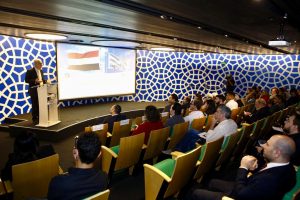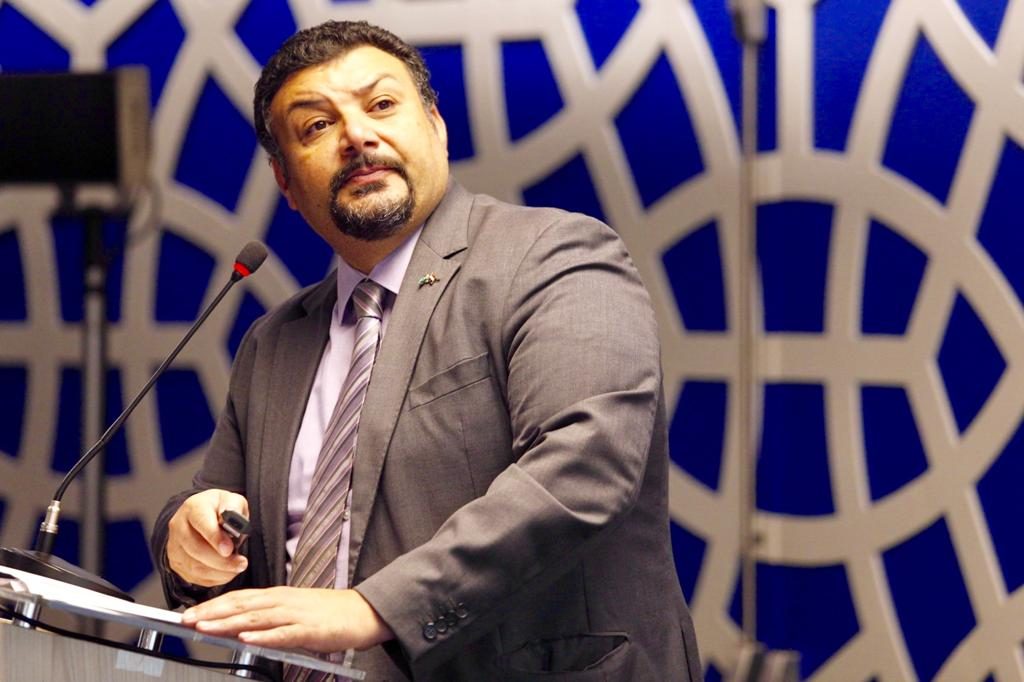São Paulo – Products get shipped from Brazil to Egypt, where they get processed and exported to other countries at reduced duties or free thereof. An invitation for Brazilian businesses to benefit from this kind of make-and-sell arrangement was extended this Thursday (16) during the seminar “Mercosur-Egypt Agreement: a market overview two years after its entry into force,” at the Arab Brazilian Chamber of Commerce in São Paulo.
The Mercosur-Egypt free trade agreement became effective in September 2017, and Egyptians intend for the bloc’s countries to also benefit from Egypt’s agreements with other parts of the world – and help boost the Arab country’s production in the process. Consul Mohamed Elkhatib (pictured above), who’s the head of Egypt’s trade office in São Paulo, said Mercosur countries can sell direct to Egypt, taking advantage of duty exemptions or discounts under the agreement, as well as export to other markets via Egypt.
“Egyptian-made products are duty-free in 77 countries,” the consul told the audience. In order for goods to be considered Egyptian-made, and therefore eligible to the benefits of Egypt’s agremeents around the world, they are required to meet a minimum nationalization rate. This is why the idea is for Brazil to export inputs or unfinished items to be completed in Egypt.
The minimum rate changes from agreement to agreement. Egypt sustains such deals with regions including the European Union, Turkey, Arab and African countries. One said agreement is the Greater Arab Free Trade Area (GAFTA), which encompasses 18 Arab countries, and requires a 40% minimum nationalization rate.

Egypt is also part of the Common Market for Eastern and Southern Africa (COMESA), comprising 15 African countries, among them Burundi, Kenya, Malawi, Ruanda, Madagascar, Uganda, Seychelles, Zambia and Zimbabwe. In this case, 35% is the minimum rate. Egypt is the only Arab country sustaining a free trade agreement with Mercosur.
Data on Egypt’s agreements were presented by the Bilateral Trade Agreements director at Egypt’s Ministry of Trade and Industry, Michael Gamal Kaddes. He went over how Egypt’s trade with partner countries has evolved. Trade with the European Free Trade Association (EFTA), composed of Switzerland, Norway, Iceland and Liechtenstein, went from USD 241 million in 2005 to USD 1.2 billion in 2017, according to Gamal.
Gamal and Elkhatib provided figures to illustrate the growth and size of Egypt’s economy. The Arab country is rolling out its Vision 2030 plan, designed to make Egypt one of the world’s biggest economies, according to the consul. There are 36,000 manufacturing facilities in the country, mostly in textiles and clothing food, engineering and electronics, chemicals, paper and wood. According to Elkhatib, labor and electricity costs in Egypt are lower than in Brazil.
Major infrastructure projects are underway in Egypt, including construction of a new capital with investment at USD 45 billion; three new power plants costing a combined EUR 8 billion; 4,800 km worth of roads, etc. The country’s economy is making strides, underpinned by a wide-ranging reforms program.
Gamal and Elkhatib also discussed other subjects in the seminar, which featured addresses from the Arab Chamber’s president Rubens Hannun and Institutional Relations manager Fernanda Baltazar. CEO Tamer Mansour and the director of the Americas and Europe Department at the Agreements Sector of Egypt’s Ministry of Trade and Industry, Rania Hagrass, engaged in conversation with the audience. Arab Chamber board members were also present, including Foreign Trade vice president Ruy Cury, director William Atui and cultural director Silvia Antibas.
More on the seminar: Mercosur-Egypt trade could be bigger in wake of agreement
Translated by Gabriel Pomerancblum




